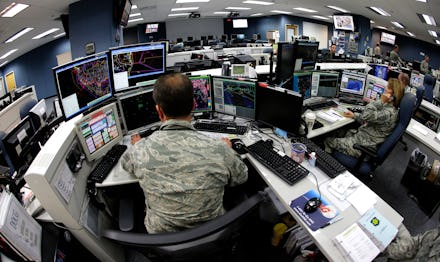The Military Is Banning Soldiers from Reading Documents Everyone Else Can See

The government isn't just keeping track of what civilians are looking at online. They're also concerned with the browsing habits of their own soldiers.
The U.S. military is now telling personnel in the Marines, Navy, Army and Air Force not to visit Glenn Greenwald's new journalism outfit the Intercept, and in some cases is blocking them from the website altogether.
According to a notice obtained by the site that was circulated to some members of the military, accessing the Intercept on work computers is "considered a security violation," and military personnel found doing so will face "long-term security issues." Military staff in three separate branches reported being blocked from visiting the site from their work stations, according to the Intercept.
The Intercept was founded by Glenn Greenwald, Laura Poitras and Jeremy Scahill in the wake of the publication of NSA documents leaked by Edward Snowden. The site often publishes articles based on classified documents (e.g., their recent report on the government's "Terrorist Screening Database"), including material gleaned from the vast Snowden archive, such as their July report on domestic spying on Muslim Americans.
The military fears that "unclassified equipment" (namely, government computers on internal unclassified networks) will be used to view classified material, even if the soldiers themselves have adequate security clearance. Officials note that accessing classified documents on an unsecured network is failing to uphold their "ongoing responsibility to protect classified material in all of its various forms." All of the classified material in question, of course, is readily available to anyone on the Internet.
"Even though I have a top secret security clearance, I am still forbidden to read anything on the website," an anonymous source told the Intercept. Military personnel reported seeing an message that they were "attempting to access a blocked website" when they tried to visit the site.
The directive issued by the military notes that officials are concerned about a "potential new leaker of classified information," and stories published by the Intercept would seem to justify their concern. At least one recent article relied on classified material that was produced several months after the Snowden leak, and Greenwald himself hinted at the likelihood of a separate source.
Defense Department spokeswoman Lt. Col. Valerie Henderson couldn't confirm that the orders to avoid visiting the Intercept came from the Pentagon, but provided this statement to the site:
DoD personnel have an obligation to safeguard classified information. Classified information, whether made public by unauthorized disclosure, remains classified until declassified by an appropriate government authority. DoD is committed to preventing classified information from being introduced onto DoD's unclassified networks.
This type of censorship has some precedent. In 2010, current editor-in-chief of the Intercept John Cook wrote for Gawker about a similar response to the Wikileaks disclosures. Army soldiers in Iraq were shown a warning that they'd be breaking the law if they tried to access any major news source covering the Wikileaks story. The policy prevented the soldiers from being able to get basic world news unrelated to the leak, solely because they might read a story containing classified documents on an unclassified network.
In a similar vein, the Guardian reported last year that parts of their website were being blocked by the Army because of articles relating to NSA surveillance, using the same defense that "unclassified networks" shouldn't be viewing classified documents. The practical effect of this is that the military is preventing soldiers from reading about controversial current events related to the military while at work.
The government is actively trying to minimize the chances of a Snowden-like leak happening again, even if this means blocking soldiers from reading articles that are available to the general public. In this case, the military has created a situation where the public can know more about what they're doing than those working for them.